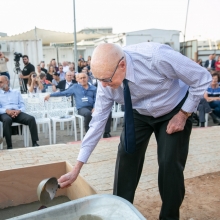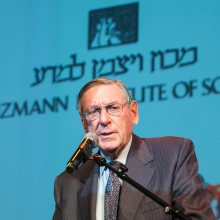Math teaching
Dr. Nadav Ehrenfeld
New scientists

Dr. Nadav Ehrenfeld
״I think that most people have stories about difficulties with math. It’s a subject that leaves people with a lot of trauma. It doesn’t need to be that way―there’s a lot of beauty and joy in math,” says Dr. Nadav Ehrenfeld.
A new member of the Department of Science Teaching, Dr. Ehrenfeld studies mathematics teaching, classroom interaction, and learning by teachers. His research explores questions of how to support mathematics students’ learning and how to support professional development for math teachers that focuses on their experiences, interests, concerns, and sensemaking.
“Unfortunately, people look at math as a ‘proxy’ to decide who’s smart. Something about the status of math makes it high stakes in terms of the access [mathematical abilities] provide, but also in terms of students’ identification as smart and successful human beings,” Dr. Ehrenfeld explains. He adds that schools tend to overemphasize a “very specific type of math,” often judging students’ performance based on memory, speed, and precision.
However, the field of math education research constantly strives to fine-tune classroom activity to include additional aspects of math like creativity, problem posing, making mistakes, working slowly, and making sense of mathematical concepts.
“For example, consider the creation of visual representations, something that is highly valued in the math field but not in schools,” he notes.
Students’ learning ecology
Dr. Ehrenfeld is enthusiastic about education. After completing his BSc in mathematics and computer science, he spent a few years in the high-tech sector, but it did not take him too long to find his way back to his true passion—teaching.
For his MSc, he worked under two supervisors—a mathematician and an education researcher. At the time, he was teaching math in several frameworks, including a class of ultra-Orthodox students preparing for higher
education. He coached them from a first-grade level to high school matriculation-level math over the course of a year and found himself fascinated by the classroom culture.
“There was something different there―how they learned, how they talked―and I tried to understand how their Talmud study background came into the math class.”
He realized that the students’ entire learning ecology—their personal history and where they came from—must be an integral part of teaching. He believes the concept of “learning ecology” applies to teachers as well as students and is a core aspect of his work.
Adapting instructional goals
Dr. Ehrenfeld identifies as part of three different research communities: learning sciences, mathematics education, and teacher professional development, and is trying to create connections between these disciplines to provide a more complete picture of mathematics teacher learning processes.
Rather than evaluating how a certain educational activity helps a teacher improve a specific issue, his research conceptualizes teacher-learning ecologies, meaning how multiple environments shape teaching and teacher-learning activities.
For example, the war that erupted following the devastating attacks of October 7, prompted Dr. Ehrenfeld to launch a collaboration with colleagues from the Hebrew University of Jerusalem to study how teachers in the newly formed schools for displaced Israeli students were adapting their teaching goals and practices to the new socio-political circumstances.
“One of my criticisms about research on professional development for teachers is that generally, we evaluate a certain symposium or course and try to understand how course content ‘X’ leads the teacher to improve ‘Y,’ abstracted from the ecology of teacher learning.
However, teacher development does not happen during a single course, it happens as they try different
strategies in the classroom, in their staff meetings, and in conversations in the school hallway. So, what interests me more is how these multiple contexts work together to promote change in teaching.”
Dr. Ehrenfeld is also committed to research-practice partnerships between education scholars and schools, teacher teams, and professional development leaders. He hopes that such an approach to professional development will better support teachers in being responsive to their students’ learning process, with an emphasis on what he calls “ambitious and equitable mathematical teaching.”
He wants to help math teachers develop more ambitious academic and social goals, thereby making classes richer in both mathematical thinking and discourse.
Dr. Nadav Ehrenfeld joined the Department of Science Teaching in September 2023. He and his wife, Avital, a graphic designer, have two children, Karmi and Ali, and live on the Weizmann campus.
Education and select awards
-
BSc (2011) and MSc (2016), Ben-Gurion University of the Negev
-
PhD, Peabody College of Education and Human Development, Vanderbilt University, Tennessee (2022)
-
Postdoc, Vanderbilt University (2022-2023)
-
Faculty of Natural Sciences MSc Fellowship, Ben-Gurion University (2013-2015); Zabey Award for Outstanding MSc Thesis, Faculty of Natural Sciences, Ben-Gurion University (2016); Naomi Miyake Best Student Paper Award, Computer Supported Collaborative Learning Conference (2019); Peabody College PhD Fellowship (2017-2022); Best Conference Paper nomination, International Conference of the Learning Sciences (2023)








